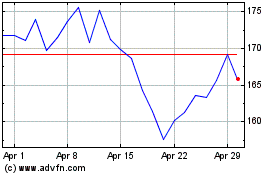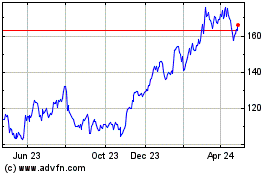By Yoko Kubota and Dan Strumpf
This article is being republished as part of our daily
reproduction of WSJ.com articles that also appeared in the U.S.
print edition of The Wall Street Journal (April 20, 2018).
HONG KONG -- China intensified the tit-for-tat trade battle with
the U.S. on Thursday, with antitrust regulators warning that they
have "hard to resolve" concerns about Qualcomm Inc.'s planned $44
billion purchase of NXP Semiconductors NV, potentially creating a
stumbling block for the deal.
The move follows a decision by the U.S. Commerce Department to
ban sales of American components to Chinese telecommunications
company ZTE Corp., as well as threats from the White House to
impose tariffs on $150 billion worth of Chinese goods to punish
what it says are efforts to steal U.S. technology.
The escalating tensions have put technology firms at the center
of a trade fight between the U.S. and China, placing new
constraints on the companies' strategic plans and threatening their
access to giant markets.
"China wants very much to flex its muscles. It can certainly
inflict pain on one large U.S. company, Qualcomm," said Peter
Fuhrman, chairman and chief executive of investment and advisory
firm China First Capital. He said current tensions make this "the
fraughtest moment in the 30-year history of U.S.-China technology
trade and mutual reliance."
Washington has for years warned about China acquiring U.S.
technology through unfair means, and protested that Beijing is
walling off the world's biggest internet market from American
companies. Beijing has in turn vowed to defend its tech champions,
fueling a multifront battle that is catching many of world's
biggest tech companies in the crossfire. During a visit to China
last month, Apple Inc. Chief Executive Tim Cook urged President
Donald Trump to support free-trade policies.
Qualcomm's supposed strategic value to the U.S. saved the
company from a possible hostile $117 billion takeover last month by
Broadcom Ltd., which was based in Singapore but has since changed
its domicile to the U.S.
Mr. Trump quashed Broadcom's pursuit of Qualcomm, citing
national-security concerns raised by China's growing strength in
advanced technologies. These include the fifth-generation wireless
technology, known as 5G, that will usher in faster, more powerful
connections.
The block put the mobile-chip company firmly at the center of a
growing tech rivalry between its home country and its biggest
market: China, which accounts for almost two-thirds of Qualcomm's
revenue.
China's Commerce Ministry spokesman, Gao Feng, said Thursday a
preliminary review of Qualcomm's NXP deal turned up issues that
make "it difficult to eliminate the negative impact," but he didn't
rule out the possibility of an eventual approval.
Qualcomm said Thursday that it refiled its application with
Chinese regulators, and agreed with NXP to extend the deal's
deadline by three months to July 25.
Qualcomm has been waiting for Beijing's approval to proceed with
the purchase of the Dutch company, having secured permission from
the eight other major antitrust regulators around the world. The
deal is seen as crucial to San Diego-based Qualcomm, which needs to
look for growth beyond its dominance in the smartphone sector. NXP
specializes in making chips for automobiles, a rapidly growing
market.
On Wednesday, Qualcomm said it began laying off an unspecified
number of employees to fulfill a promise to boost profit by
shedding $1 billion in expenses. The layoffs are part of a
cost-reduction program unveiled in January intended to persuade
investors of the company's prospects as it fended off Broadcom
Mr. Gao also took aim at the seven-year U.S. ban on selling
technology to ZTE -- punishment for ZTE breaching a pact reached
last year to resolve alleged sanctions violations over the sale of
gear to Iran. The ban is seen as potentially crippling for ZTE,
which is one of two Chinese companies seeking to take a global lead
in establishing 5G mobile internet networks.
"The action targets China," Mr. Gao said. "However, it will
ultimately undermine the U.S. itself." He said the U.S. is risking
"tens of thousands of jobs and shaking international confidence in
the U.S. business environment."
The interdependence of technology companies across the Pacific
means that a tech war isn't a zero-sum game. Qualcomm is one of
several U.S. suppliers hurt by the ban on sales to ZTE. The ban
potentially covers software such as the Android operating system,
developed by Google parent Alphabet Inc., that powers ZTE
smartphones. ZTE is working to find ways to preserve its access to
Android, according to a person familiar with the matter.
A Google spokesman declined to comment Thursday. ZTE also
declined to comment. It is delaying the release of its quarterly
earnings report as it wrestles with the implications of the
ban.
U.S. punishment of a company seen as a national champion touched
off rallying cries for support on Chinese social media, with photos
circulating of restaurants and stores displaying signs saying "We
are all ZTE people."
Hu Xijin, the editor of nationalistic tabloid Global Times, who
has a large social-media following, wrote in a post Wednesday that
the ban was an attempt to edge out China in the race to dominate 5G
technology.
"Chinese society absolutely needs to support ZTE and back
Huawei," Mr. Hu wrote, referring to China's other major
telecom-gear maker.
Huawei Technologies Co., the world's largest provider of telecom
equipment, acknowledged this week that after years of difficulties
in the U.S., it is going to refocus on other markets.
The U.S. Federal Communications Commission approved a measure
this week that would bar wireless carriers from using government
subsidies to buy telecom gear from Chinese manufacturers. The U.S.
Trade Representative's office also said this week it is considering
retaliation for China's restrictions on U.S. providers of
cloud-computing and other services.
"Everything here is about leverage and China understands its
position in that respect very well," said Mark Natkin, managing
director of Marbridge Consulting, a Beijing-based telecom, media
and technology consulting company. "With tech companies playing an
increasingly pivotal role in economic and geopolitical policy, it
will be difficult for them not to be drawn into the tensions
between the two countries."
--Lin Zhu and Josh Chin in Beijing, Natasha Khan in Hong Kong,
Ted Greenwald in San Francisco and Liza Lin in Shanghai contributed
to this article.
Write to Yoko Kubota at yoko.kubota@wsj.com and Dan Strumpf at
daniel.strumpf@wsj.com
(END) Dow Jones Newswires
April 20, 2018 02:47 ET (06:47 GMT)
Copyright (c) 2018 Dow Jones & Company, Inc.
QUALCOMM (NASDAQ:QCOM)
Historical Stock Chart
From Mar 2024 to Apr 2024

QUALCOMM (NASDAQ:QCOM)
Historical Stock Chart
From Apr 2023 to Apr 2024
